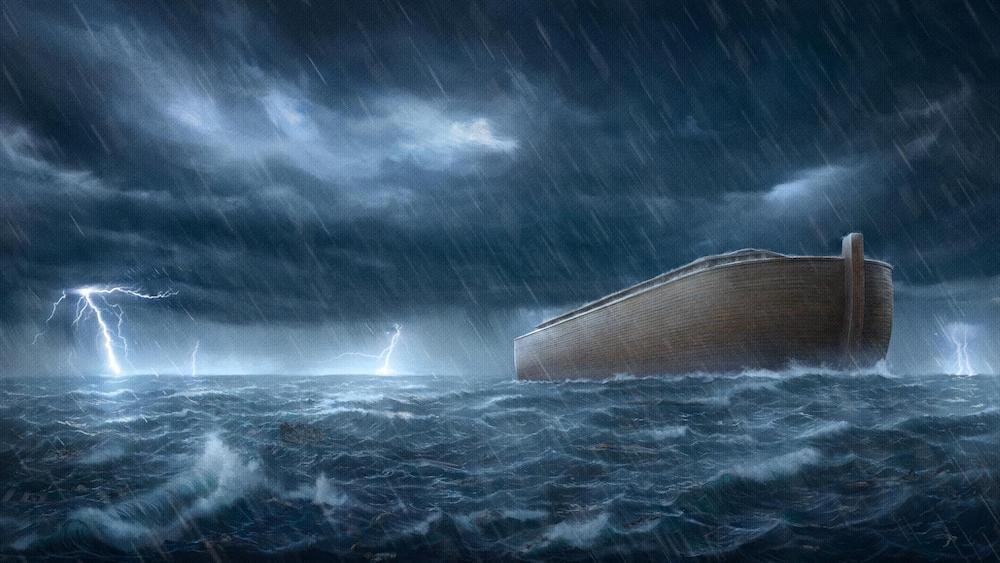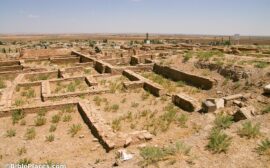By: Tony Williams | January 19, 2025
In the 21st century, the idea of the Biblical flood is likely to bring about a variety of responses in conversations. Some may regard it as an allegory, not to be taken literally. Others might say that it has its roots in a real event, but not of “Biblical proportions”. Others might even use it as a battering ram to accuse a God they may not believe in of being a cruel deity.
If the flood as outlined in Genesis is true, there are both physical and spiritual implications that affect every human being alive today. I would encourage the reader to consider the flood not as a liability to the faith, but as an opportunity to allow those with whom they speak to consider the evidence for the flood. The flood is an opportunity to demonstrate the physical evidence that corroborates the Bible. It is a way to remember that the fear of the Lord is the beginning of wisdom (Psalm 111:10). It is also a way to show the rich mercies of God toward His image bearers.
In Defense of the Flood: Physical Evidence
All of the evidence for a real, global flood has been well documented by others, but a few basic pieces of the puzzle should be enough to at least challenge the skeptic to consider a massive, worldwide flood as opposed to a slow and gradual process of geological formation. Marine fossils are found high on mountains. There are massive fossil graveyards of land and sea creatures buried together in very rapid succession. The amount of fossils that are very well preserved indicates the massive die-off of plants and animals, as well as a rapid burial. The same sedimentary layers (by definition, laid down by water) span the globe and cross otherwise unconnected continents. There is no evidence of deep time between layers of sediment, indicating that the various layers we see today were laid down rapidly. [1]
In Defense of the Flood: Current Geological Assumptions
Counter-claims to the flood are nothing new, but the ideas that have eroded the historical understanding of our planet are owed largely to Charles Lyell, who popularized the idea of a very slow progression of geological erosion and shifting over massive epochs of time. While not the main topic of this paper, one should be able to easily find the assumptions that undergird current geological and biological theories about the formation of the earth and its plant and animal kinds. Suffice it to say the assumptions are not often open to the idea of Biblical creation and catastrophe. However, many have and continue to counter the claims of long ages of time in favor of a recent flood and a recent creation.[2]
In Defense of the Flood: Lack of Judgment
In a prelude to the flood, Genesis 6:5 says, “The Lord saw that the wickedness of man was great in the earth, and that every intention of the thoughts of his heart was only evil continually.” Genesis 6:9 says, “the earth was corrupt in God’s sight, and the earth was filled with violence.” The Bible does not describe this evil in detail, but one is left to wonder how violent and evil the world was before the flood.
The ideas that helped to diminish the flood’s place in Christendom’s collective memory and imagination has surely allowed many to consider themselves immune from the judgment of God. The Bible makes it clear that the flood occurred because of the wickedness of man on the earth in those days. If we can dismiss the idea that God would ever bring such a destructive end to so many, our own sins seem less dangerous. Without the potential of destructive judgment, it is far easier to shrug your shoulders and ask, “Who am I to judge?”
We live in an age that many have dubbed “postmodern”. This effectively means there is no true right or wrong. It could be said that everyone “does what is right in his own eyes”. (Judges 21:25) Will the laws that God instituted bend to man’s will to be his own god forever? If the evidence we have in the Bible and in the ground shows us anything, it is that He will not allow us to hurt one another forever. While this may not be a pleasant aspect of the Christian worldview, it is a critical one. Grace is not understood fully without an understanding of guilt and judgment.
In Defense of the Flood: The Grace of God
A wonderful, and also underrated part of the flood story is the idea that God saw that Noah was “righteous” in that generation. (Genesis 7:1) If there were millions or even billions on earth as some speculate when the flood occurred, why would one man gain the favor of God? Notice that God did not mention any of the wars Noah won. He did not mention any of the wonderful things he did in his community or the money he donated to charity. He only says that Noah was righteous before the Lord. To be righteous wasn’t a measure of what Noah did, but rather what he didn’t do. His righteousness was rooted in his obeying the Lord as opposed to any works he may have done.
Noah spent decades building the ark. This is surely in part because it takes a lot of time to build a boat that big and get all the animals and food together. [3] It is also theorized that this time was also to allow other people on earth to repent and turn back to God before the judgment to come. We don’t know this for certain, but as God allowed hundreds of years to pass for other judgments, this only makes sense.
In Defense of the Flood: Rest
The name Noah means “rest”. Genesis 5:29 says that his father Lamech named him Noah because, “Out of the ground that the Lord has cursed, this one shall bring us relief from our work and from the painful toil of our hands.” (Genesis 5:29) Noah, in his obedience to God’s command to build the ark, saved those who entered the one door on the ark that men and animal kinds entered through.
Thousands of years later, Jesus Christ would tell His followers that He was the door that all must enter for salvation. (John 10:9) He warned them of the judgment to come to those refusing to obey God’s commands. Then, He willingly gave up His life to die for all the sons and daughters of Noah who continued to fail to obey God in the hopes that some would repent and turn to Him for reconciliation with their Creator Who loved His image bearers enough to die in their place. Again, notice that it is still not works that are required to enter the door, but repentance and obedience to enter.
In Defense of the Flood: What Jesus Said
In Matthew 24:37-39, Jesus speaks of His return at the end of days and specifically speaks about Noah and the flood when he says, “For as in those days before the flood they were eating and drinking, marrying and giving in marriage, until the day when Noah entered the ark, and they were unaware until the flood came and swept them all away, so will be the coming of the Son of Man.”
The flood should not be something that Christians fear researching and talking about with others. It is an opportunity to talk about the evidence for the Bible’s accuracy in detailing humanity’s shared history. It is an opportunity to humbly talk about the danger we all face in our disobedience, even in the temporary grace of a very patient God. Most importantly, it is an opportunity to talk about the forever grace offered in Jesus Christ, who is the only way for mankind to be reconciled to his Creator.
About the Author
Tony Williams

Tony Williams is currently serving in his 20th year as a police officer in a city in Southern Illinois. He has been studying apologetics in his spare time for two decades, since a crisis of faith led him to the discovery of vast and ever-increasing evidence for his faith. Tony received a bachelor’s degree in University Studies from Southern Illinois University in 2019. His career in law enforcement has provided valuable insight into the concepts of truth, evidence, confession, testimony, cultural competency, morality, and most of all, the compelling need for Christ in the lives of the lost. Tony plans to pursue postgraduate studies in apologetics in the near future to sharpen his understanding of the various facets of Christian apologetics.
Notes
[1] For more information, see Dr. Andrew Snelling’s article in Answers in Genesis: Snelling, A. (2021, July 1). Global Evidences of the Genesis Flood. Answers in Genesis. https://answersingenesis.org/the-flood/global/evidences-genesis-flood/
[2] I encourage the reader to investigate the writings available for free on websites dedicated to these topics like Answers in Genesis (answersingenesis.org) or the Institute C=for Creation Research (icr.org).
[3] For a more thorough study of this topic I recommend John Woodmorappe’s book, Noah’s Ark: A Feasibility Study (1996) or Ken Ham and Bodie Hodge’s book, A Flood of Evidence (2016).
(c) 2025. Bellator Christi.






can I ask you to take a look at this blog post he claims all of Paul’s visions are just hallucinations in this invalidates the resurrection ask you to make a response to this https://turchisrong.blogspot.com/2020/10/my-reply-to-five-reasons-to-doubt.html